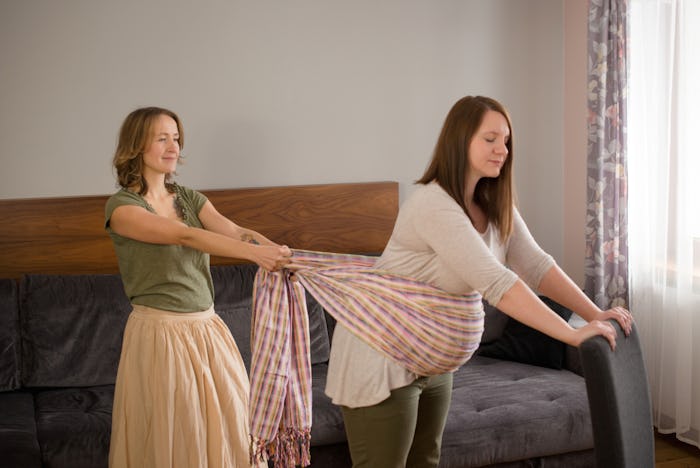Life

Here's Why Every Pregnant Woman Needs To Know About Birth Coaches
When you're pregnant people find themselves bursting with "helpful" information about things you "must" do (and things to avoid at all costs) if you want to have a healthy delivery. You'll hear a list of things you "must" buy, people you "must" allow in the delivery room, and the people you "must" have on your birthing team, unless you want to kiss your dream delivery goodbye. Cue confusing terms like birth doula, birth coach, postpartum doula, and lactation doula. Maybe it would help to start out by defining exactly what birth coach is and how they can help you have the birth experience you've undoubtedly outlined in your birth plan. You know, just for starters. Then I guess you can start worrying about how you're supposed to fit all the aforementioned people in the damn labor and delivery room.
On the American Congress of Obstetrics and Gynecologists' (ACOG) website, the terms "birth coach" and "doula" are seemingly employed as one and the same. The site defines the word, "doula" as "a birth coach or aide who gives continual emotional and physical support to a woman during labor and childbirth." BabyCenter also uses the words "doula" and "coach" interchangeably in their definition of the word "doula." They go on to define a doula as follows: "A birth doula is a trained labor coach who assists you during labor and delivery. She provides you with continuous emotional support, as well as assistance with other non-medical aspects of your care."
So now that we have gotten semantics out of the way, let's drill down a little further on what, exactly, the role of a birth coach (or birth doula, or labor coach, or labor doula) is. According to the Mayo Clinic's website, your birth coach is there to provide physical and emotional support to you (and your partner) during your labor and delivery process. Her and/or his role, as the Mayo Clinic explains, might include helping you with your breathing exercises, reassuring you and encouraging you, explaining what's happening during labor and postpartum, providing support for your loved ones, and even helping you with breastfeeding.
Here is what's not on the list of birth coach responsibilities: medical tasks. Birth coaches, while extremely helpful in their supportive role to the laboring or postpartum woman, are not there to diagnose or treat medical conditions or even take your temperature. On the website for DONA International (one of the largest doula certifying organizations), under their description of the "Updated Standards of Practice," they state:
"The DONA certified or member doula does not perform clinical or medical tasks, such as taking blood pressure or temperature, fetal heart tone checks, vaginal examinations or postpartum clinical care. The DONA certified or member doula will not diagnose or treat in any modality."
But just because a birth coach cannot assist with medical procedures doesn't mean that the medical community values them any less. Quite the contrary. Earlier this year, ACOG released a statement on their website that said, "For low-risk pregnancies, obstetrician-gynecologists and other maternity care providers should consider labor and delivery approaches that facilitate limited medical intervention." The article goes on to explain that part of these recommendations suggest that women benefit from "continuous emotional support," such as that offered by trained labor coaches (like doulas). ACOG further states in the article that this kind of support has been associated with "improved birth outcomes," including shortened labor and fewer deliveries requiring operations (like C-sections).
The Mayo Clinic's website goes into a little more detail about just how positive the effects of having a birth coach's help can be during labor and delivery. According to their site, studies (though they admit they are limited in number) have shown that the the support of a birth doula might also be associated with a decrease in the use of pain-relief drugs during labor, and a decrease in negative childbirth experiences.
As for who should be your birth coach, experts advise that the best person for the job isn't someone you already know. In a paper published on the U.S. National Library of Medicine National Institute of Health website about the importance of "continuous support" for women during labor and delivery, it specifically notes "continuous support was most effective when the provider was neither part of the hospital staff nor the woman's social network." So don't ask your sister to be your birth coach, OK?
The ultimate take away is that women benefit tremendously from the assistance of a birth coach or doula during the childbirth process. Though the nomenclature can be confusing, to be sure, but one thing is clear: if you can afford a birth coach, you will likely have a much more positive labor and delivery experience.